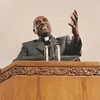"Boy, did our small group ever have a lively discussion at our last meeting," said Debbie. Their group was studying I Corinthians. "When we got to I Corinthians 6:9, which talks about homosexuality, Dave said that God views it as an abomination."
Dave, Debbie's husband, was most likely recalling a scripture passage from Leviticus 2:13. The King James Version uses the term abomination in regard to a man lying with a man. Though biblically correct, his word choice disturbed a group member who may have viewed Dave as self-righteous and condescending. The result was what Debbie labeled a "lively discussion".
Lively group discussions can happen for a variety of reasons. They may occur because someone disagrees with what the Bible says or because people have different interpretations of what they believe it means. With biblical literacy declining and biblical revisionism on the rise, some Christians edit out unpopular or unpalatable beliefs or issues on which the Bible takes a stand. Seeking to teach biblical truths in our groups may place us in lively discussions. Here are some insights for managing them:
- Choose your words carefully when group members disagree with scripture. Avoid words that inflame and spur on heated debate.
- Exhibit self-awareness of your own susceptibility to sin. Avoid finger pointing. Remember, Jesus cautioned us to remove the board from our own eye first.
- Stand firm. Though it is tempting to back down when people challenge your scriptural stand, it is important to hold fast to God's principles. Following Christ has never been popular. It may mean taking some flack.
- Give the debater more scripture that backs up what you are teaching, and encourage him/her to research the matter.
If you are uncomfortable with where the group left off or are not as comfortable as you would like with your knowledge on the subject the group discussed, consider inviting a more schooled Bible teacher to attend your next small group meeting. The teacher can follow up and perhaps answer any additional questions that linger among your members. Your role would be to act as a back up teacher and help facilitate the discussion. Sometimes the guest teacher can field tough questions better than the average lay person (and with a bit more diplomacy). This can lend credibility to the discussion and help individuals work their way through issues.
Occasionally, lively discussions occur when group members disagree as to the Biblical interpretation of a passage. Not all passages are clear cut. Handle discussions carefully so as not to cause divisions among group members or create wounds that will not heal. If the discussion appears to be getting too heated, group facilitators should halt the discussion and pray with members, and then move on to another passage or topic. The facilitator can offer to meet separately with the individual(s) in question, or they can make a statement that all group members probably will not reach a consensus and that this is OK.
Help group members to see the lively discussion as a motivator to seek the Lord more fully and to be open to whatever the He would say to them. The "lively discussion" may be the point where life change begins.









